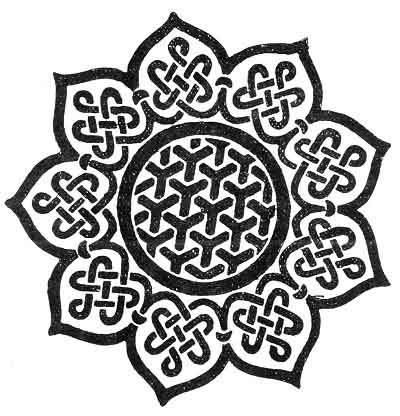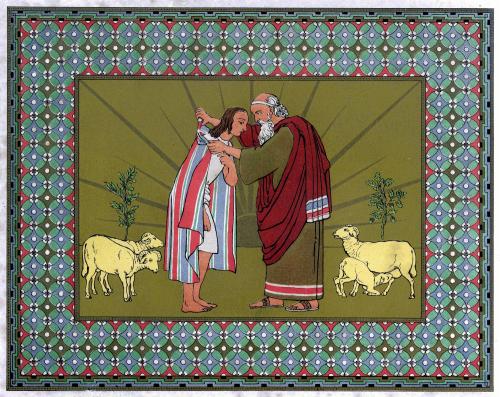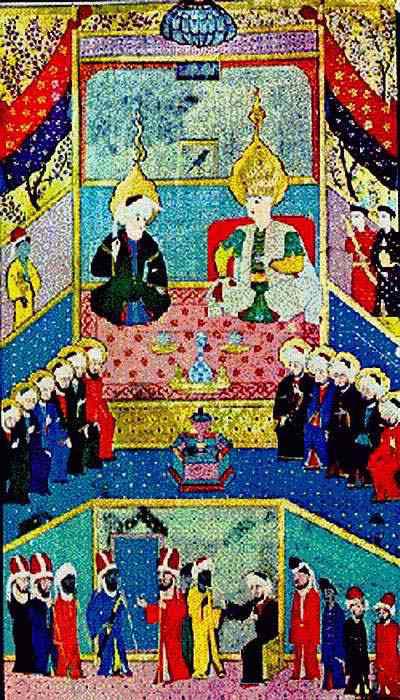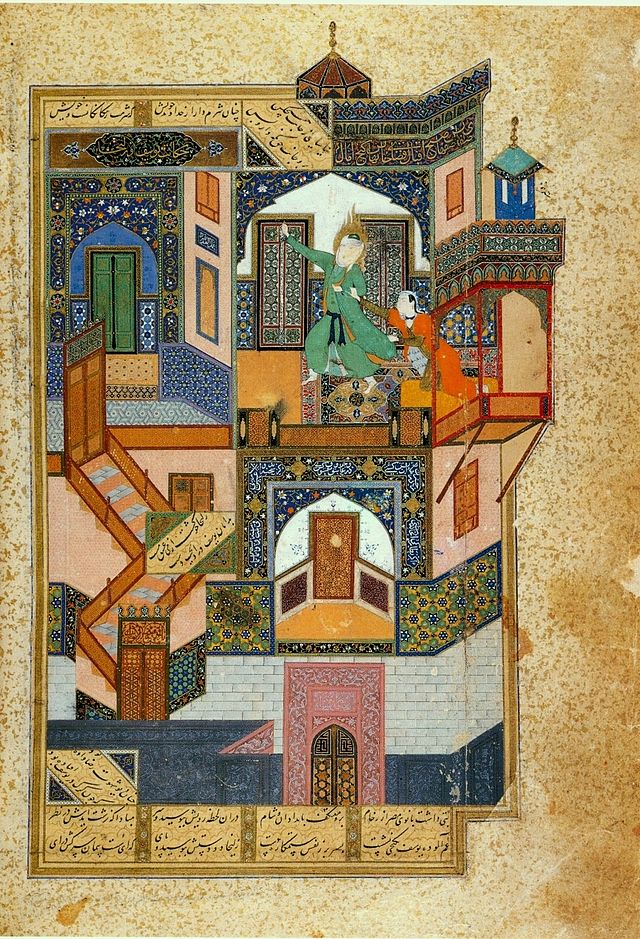 |
Craig White's Literature Courses Critical Sources
mythic backgrounds & scriptural texts for the
Hippolytus / Phaedra archetype
applicable to Hippolytus, Phaedra,
|
 Josef Geirnaert (1791-1857), Phaedra and Hippolytus (Bowes Museum) http://artuk.org/discover/artworks/phaedra-and-hippolytus-44377 |
Euripides's
Hippolytus, Racine's Phaedra, and
O'Neill's
Desire
Under the Elms
![]() a
middle-aged or mature woman is sexually attracted to & tempts a young man;
a
middle-aged or mature woman is sexually attracted to & tempts a young man;
![]() a son or young man is
accused of seducing his father's wife or an older man's mistress.
a son or young man is
accused of seducing his father's wife or an older man's mistress.
As an expression of the Oedipal Conflict, the Hippolytus / Phaedra archetype shows a later, less infantile instance of different-sex, cross-generational attraction.
Warning:
![]() These male-authored texts may embody male fantasies and
wish-fulfillment. These stories present women as instigators of intra-family sexuality, when
empirical evidence and experience indicate that men are more often
instigators.
These male-authored texts may embody male fantasies and
wish-fulfillment. These stories present women as instigators of intra-family sexuality, when
empirical evidence and experience indicate that men are more often
instigators.
![]() The Oedipal Conflict has far
more status as a description of male psychology than as a model for
women's psychology.
The Oedipal Conflict has far
more status as a description of male psychology than as a model for
women's psychology.
![]() Contrarily, recently popular
characterization of middle-aged women as "cougars" prowling for younger men may indicate
popular reception for this archetype:
Cougar Club (film, 2007), The
Cougar (reality show, 2009), and Cougar Town (sitcom, 2009-);
also How Stella Got Her Groove Back (novel & film, 1998).
Contrarily, recently popular
characterization of middle-aged women as "cougars" prowling for younger men may indicate
popular reception for this archetype:
Cougar Club (film, 2007), The
Cougar (reality show, 2009), and Cougar Town (sitcom, 2009-);
also How Stella Got Her Groove Back (novel & film, 1998).
![]() Does media excitement over women high-school teachers seducing male teenagers embody the same pattern? (At the college level, male
teachers appear far more likely to hit on women students than women teachers
on male students.)
Does media excitement over women high-school teachers seducing male teenagers embody the same pattern? (At the college level, male
teachers appear far more likely to hit on women students than women teachers
on male students.)
![]()
Classical Sources for Hippolytus / Phaedra story
|
from
Zimmerman, Dictionary of Classical
Mythology
Hippolytus.
Son of Theseus and Hippolyta. After the death of Hippolyta, Theseus married Phaedra, daughter of King
Minos and sister of Ariadne. Phaedra
fell in love with Hippolytus, and when he refused her advances, she falsely
accused him to Theseus. Theseus readily believed Phaedra's charges; he asked
Poseidon to punish his son. As
Hippolytus fled from his father, his horses were frightened by the sea-calves of
Poseidon; the chariot overturned and Hippolytus was killed.
Aeneid vii; Metamorphoses xv; Chaucer, The
Legend of Good Women; Racine, Phedre;
Edmund Smith, Phaedra and Hippolytus.
Phaedra. Daughter of Minos and Pasiphae; sister of Ariadne; wife of Theseus;
mother of Acamas and Demophon. Phaedra
became infatuated with her stepson Hippolytus and made overtures to him, but was
rejected. In anger and humiliation
she hanged herself, but left a message accusing Hippolytus of having attacked
her. . . . Euripides, Hippolytus; Seneca, Hippolytus
[a.k.a. Phaedra?] . . . .
from
The Oxford Companion to Classical
Literature
Hippolytus. Illegitimate son of Theseus and the Amazon Hippolyta
. . . .
a man of perfect purity of life, devoted to the hunt, and a
worshipper of the goddess Artemis. Phaedra,
daughter of Minos, king of Crete, and wife of Theseus, fell in love with him,
but he rejected her advances. From
resentment of his scorn Phaedra hanged herself, after writing a letter to
Theseus denouncing him as her seducer. . . .
In some versions of the tale, Artemis persuades Asclepius
[Gk. god of medicine] to restore him
to life, and he appears again in Roman legend. Virgil and other authors relate that Hippolytus, when he fell from his
chariot, was conveyed away by Diana to the grove of the nymph Egeria, near
Aricia in Latium, where under the name of Virbius he lived out his days. . . . |
|
![]()
Biblical Sources for story of Joseph & Potiphar's Wife
(comparable to Hippolyus / Phaedra story)
from
Reader's Encyclopedia (ed. Benet,
1956)
Potiphar's
Wife.
In the Bible's Old Testament and the Koran, the wife of Joseph's master in Egypt. Joseph fled from her advances, leaving his coat behind him, whereupon she
accused him of evil and had him cast into prison. Some Arabian commentators have called her Rahil, others
Zuleika, and it is this latter name that the 15c Persian poet gives her in his
Yusuf and Aulaikha.
![]()
|
from The Bible (Revised Standard Version)
|
|
|
Genesis 39: 6-21 And Joseph was a goodly person, and well-favored. And it came to pass after these things, that his master's wife cast her eyes upon Joseph; and she said, Lie with me. But he refused, and said unto his master's wife, Behold, my master [knows] not what is with me in the house, and he hath committed all that he hath to my hand; there is none greater in this house than I; neither hath he kept back anything from me but thee, because thou art his wife: how then can I do this great wickedness, and sin against God? And it came to pass, as she spake to Joseph day by day, that he hearkened not unto her, to lie by her, or to be with her. And it came to pass about this time, that Joseph went into the house to do his business; and there was none of the men of the house there within. And she caught him by his garment [i.e., the coat of many colors], saying, Lie with me: and he left his garment in her hand, and fled, and got out. And it came to pass, when she saw that he had left his garment in her hand, and was fled forth, that she called unto the men of her house, and spake unto them, saying, See, a Hebrew [has been brought] unto us to mock us; he came in unto me to lie with me, and I cried with a loud voice: and it came to pass, when he heard that I lifted up my voice and cried, that he left his garment with me, and fled, and got him out.
And
she laid up his garment by her, until his Lord [Potiphar] came home.
And she spake unto him according to these words . . . .
And
it came to pass, when his master heard the words of his wife, which she spake
unto him, saying, After this manner did thy servant to me; that his wrath was
kindled. And Joseph's master took
him, and put him into prison . . . .
|
|
![]()
|
Koranic sources for story of Yusuf & the wife of Azeez
from
The Koran Interpreted, trans. Arthur
J. Arberry. NY: Macmillan, 1955. Islam regards Joseph or "Yusuf" as a major prophet. An entire chapter (sura) of the Qur'an is dedicated to the story of Yusuf, which resembles the Biblical narrative of Joseph except for some additional details. The Qur'an doesn't name the woman in this story but identifies her as "the wife of Azeez," Azeez being an honorific title for Potiphar. In other Muslim literature the woman is given the name Zuleika or Rahil. The story of Yusuf and Zuleika is retold in many Persian (Iranian) poems, notably in the 15th-century poet Jami's Haft Awrang ("Seven Thrones"). The Sufi mystic poets Rumi and Hafiz interpreted Zuleika's infatuation for Joseph with the soul's longing for God.
|
|
|
from
The Koran Interpreted, trans. Arthur
J. Arberry. NY: Macmillan, 1955. from Sura 12. Now the woman in whose house [Yusuf] stayed solicited him, and closed the doors on them. "Come," she said, "take me!" "God be my refuge," [Yusuf] said. "Surely my lord has given me a goodly lodging. Surely evildoers do not prosper." For she desired him; and he would have taken her, but [except] that he saw the proof of his Lord. So was it, that we might turn away from him evil and abomination; he was one of our devoted servants. They raced to the door; and she tore his shirt from behind. They encountered her master by the door. She said, "What is the recompense of him who purposes evil against thy folk, but that he should be imprisoned, or a painful chastisement?" Said [Yusuf], "It was she that solicited me"; and a witness of her folk bore witness, "If his shirt has been torn in front, then she has spoken truly, and he is a liar; but if his shirt has been torn from behind, then she has lied, and he is truthful."
When [the master] saw that [Yusuf's] shirt was torn from behind, he said,
"This is of your
women's guile . . . .
Joseph, turn away from this; and thou, woman, ask forgiveness of they
crime; surely thou art one of the sinners."
|
|







